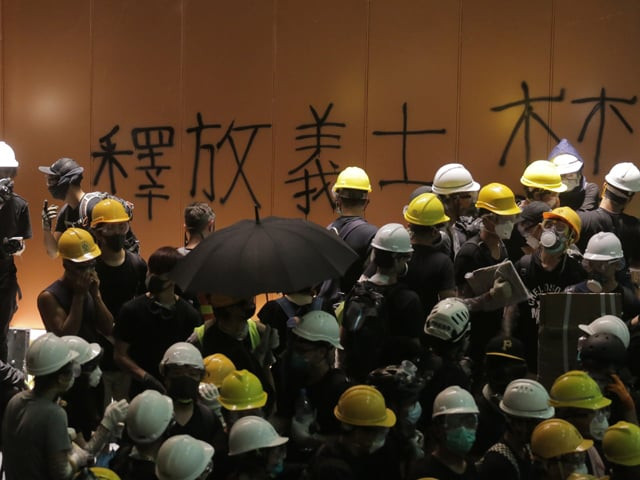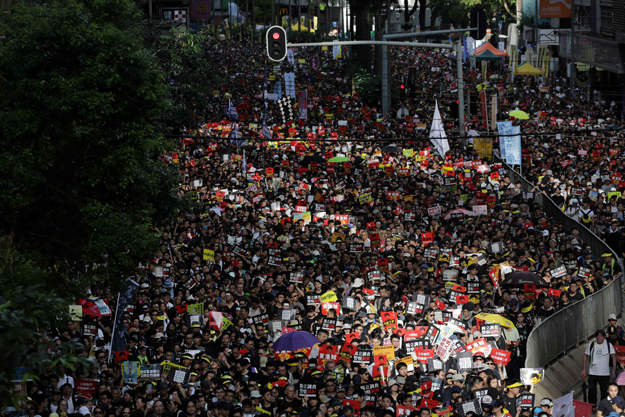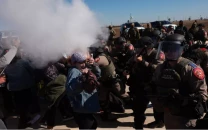Protesters storm Hong Kong parliament on China handover anniversary
They seize parliament chamber, spray walls with graffiti and tie British colonial flag to podium

Graffiti is seen on a wall of the government headquarters after protesters broke into the building in Hong Kong on July 1, 2019. PHOTO: AFP
The latest unrest ramps up tensions in the financial hub which has been rocked by three weeks of historic demonstrations against a hugely unpopular bill that would allow extraditions to the Chinese mainland.
Tens of thousands of democracy activists staged another peaceful march on Monday afternoon, calling for the city's pro-Beijing leader to step down and reverse what they see as years of sliding freedoms.
But that rally was overshadowed by small groups of mainly young, masked protesters who besieged the legislature for hours, sparking renewed clashes with police after two weeks of relative calm.
Why is Hong Kong's China extradition plan so controversial?
Under the blazing summer sky the young demonstrators made multiple attempts to smash into the building, using a metal cart as a battering ram and wielding steel poles to prize open gaps in the reinforced windows.
Riot police inside the building responded by squirting pepper spray at protesters, who unfurled umbrellas to shield themselves.
But after some six hours the anti-government demonstrators eventually breached the complex, swarming through its passageways and tearing down portraits of the city's leaders.
 Protesters attend the annual pro-democracy rally in Hong Kong on July 1, 2019. PHOTO: AFP
Protesters attend the annual pro-democracy rally in Hong Kong on July 1, 2019. PHOTO: AFPRiot police appeared to have retreated deeper inside the complex or left the building, which had been on lockdown, an AFP reporter at the scene said.
Many of those protesting said they felt compelled to take the action because the city's pro-Beijing leaders had ignored public sentiment.
Black-clad protesters in Hong Kong press for extradition bill to be axed
"We know that this is breaking the law, but we have no choice," a 24-year-old protester surnamed Cheung told AFP.
The huge rallies over the last three weeks are the latest expression of growing fears that China is stamping down on the city's freedoms and culture with the help of the finance hub's pro-Beijing leaders.
But the increasingly hardline tactics from some protesters have alienated some, with a large counter-rally in support of the police taking place on Sunday.
Although Hong Kong returned from British to Chinese rule on July 1, 1997, it is still administered separately under an arrangement known as "one country, two systems".
The city enjoys rights and liberties unseen on the autocratic mainland, but many residents fear Beijing is already reneging on that deal.
Activists have organised a march every handover anniversary, calling for greater democratic freedoms -- such as the right to elect the city's leader.
They have mustered large crowds in recent years -- including a two-month occupation of parts of the city centre in 2014 -- but have failed to win any concessions from Beijing.
"When I heard that there are clashes outside (parliament), I was very worried," Amy Siu, a 37-year-old accountant taking part in the rally, told AFP. "I'm worried about the youngsters' safety. I hope they can be rational."
"I would not blame the young people, I blame the government," added an 80-year-old protester who gave his surname Yeung.
This year's rally is framed by unprecedented anti-government protests of the past three weeks that have drawn millions, with the public angry over police use of tear gas and rubber bullets.
The spark for the current wave of protests was an attempt by chief executive Carrie Lam to pass the Beijing-backed extradition law, which she has now postponed following the public backlash.
But she has resisted calls to permanently shelve the law or step down.
As a result the demonstrations have morphed into a wider movement against her administration and Beijing.
Lam -- who has kept out of the public eye since her climbdown and has record low approval ratings -- attended a flag-raising ceremony early Monday, marking the moment the city returned to Chinese ownership 22 years ago.
But she and other dignitaries watched from indoors due to "inclement weather" -- the first time in the ceremony's history.
Her speech stuck to the conciliatory tone she has used in recent weeks.
"What happened in recent months has caused conflicts and disputes between the government and residents," Lam said. "It has made me fully understand that as a politician, I need to be aware and accurately grasp the feelings of the people."
She then raised a champagne toast alongside cabinet officials and two of her predecessors.
Police said 13 officers were also sent to hospital after being doused by an "unknown liquid" from protesters while the government released a statement condemning protesters for using "extreme violence."
But activists have vowed to keep up their civil disobedience campaign.
"Whatever happens we won't lose heart," Jason Chan, a 22-year-old accountant added. "Resistance is not a matter of a day or a week, it is long term."



















COMMENTS
Comments are moderated and generally will be posted if they are on-topic and not abusive.
For more information, please see our Comments FAQ